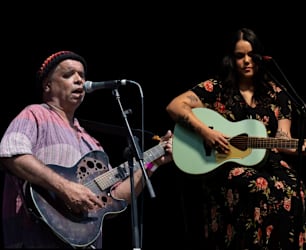Ahead of the South Coast Readers & Writers Festival, Julie Janson sits down with Elizabeth Heffernan to share her reading and writing routines.
What is your latest writing project? Why write this work?
My current writing project, The Bloody Crow, is going rather slowly because I am worn out from writing Compassion, the sequel to my historical novel Benevolence.
I am writing this new Aunty June crime novel, set in the Northern Territory where I lived for many years in remote Aboriginal communities. I am passionate about environmental issues as well as Indigenous issues. I hope that through my fiction and poetry I can change some readers' perceptions around restorative justice for First Nations people and a Makarrata. Through these means all Australians can join together in a better country that acknowledges its bloody past.
All my work investigates a First Nations perspective and mostly from a female point of view. My love of language and storytelling underpins all the writing and I often integrate Aboriginal languages such as Darug into my stories. By creating narratives with languages that are not often spoken, I hope to regenerate interest in Australian Indigenous culture and language.
What do you love about it? Are there any challenges?
The challenges involved in novels, such as crime fiction, are mostly to do with the rules of the genre. By breaking some conventions I can introduce the supernatural world and celebrate Indigenous characters such as Private Investigator, Aunty June.
What is your earliest reading memory?
My earliest reading memory is Winnie the Pooh by A.A. Milne. My mother is of English heritage and walked many miles pushing a pram to borrow library books so my brothers and I had access to literature and art. I remember being given the children’s book Walkabout by James Vance and learning about two lost children in the desert who are saved by an Aboriginal boy.
The book that made you want to be a writer?
I read every play in the Gladesville Public Library and fell in love with theatre. Especially Eugene O'Neill, Tennessee Williams and Ray Lawler’s Summer of the Seventeenth Doll. I watched my Aunty Rita perform in pantomimes in Sydney and I wanted to be an actress like her.
The book that made me want to be a writer was Puckoon by Spike Milligan. I lay on my bed as 10-year-old in our Boronia Park housing commission home and laughed until I cried.
The writer who changed your mind?
The writer who changed my mind about Australian history and literature was Xavier Herbert’s Poor Fellow My Country. It opened a world of desert landscapes and Indigenous characters. The sheer bravery of writing such a long adventurous novel opened my mind to the possibilities of fiction writing.
The book you reread?
Jane Eyre by Charlotte Bronte, because it is perfect.
The book you could never read again?
Ulysses by James Joyce.
The book you discovered later in life?
The Macquarie Dictionary of Aboriginal Words and this book sits beside me when I write everything.
The book you are currently reading?
The books I am currently reading are mostly crime novels, but I find the male writers of crime fiction too violent. I like Jane Harper’s The Dry. A wonderful book that I am reading that has been reissued is Fight for Liberty and Freedom by John Maynard.
Your comfort read?
Charles Dickens, any of his superb novels.
Your desk?
My desk has a computer and is in my high ceiling lounge room at a long wooden dining table, where I can spread out notes, books, pictures and anything that inspires me work. The view is of native trees in a quiet country town and my dog Missy sleeps beside my chair.
Your writing routine?
My writing routine is irregular because I am attending at least six more writing festivals this year and I travel a great deal. I try to write every day and start early in the morning with a few pages, but this can often change into many pages. I often forget about time and look up after four hours of writing. Chocolate helps. My husband has his own office and respects my need for quiet. My children and grandchildren live in other towns and cities all over Australia.
The South Coast Readers and Writers Festival is coming to Thirroul on 13-14 July 2024. With a festival line-up featuring more than 40 stellar award-winning authors, talented new voices, acclaimed poets, broadcasters and thinkers across 22 sessions, the weekend promises to be filled with captivating stories, thought-provoking discussions, and inspiring conversations.
Book your tickets now: https://southcoastwriters.org/festival







